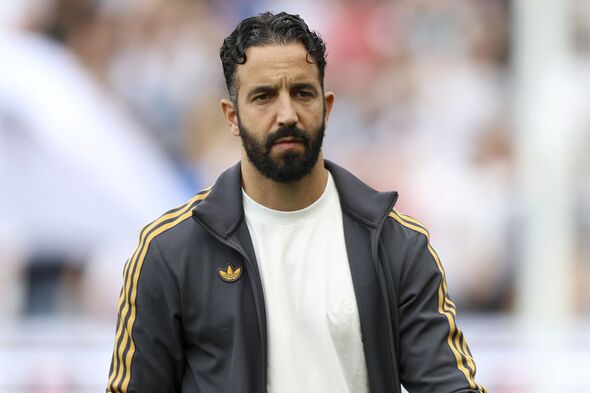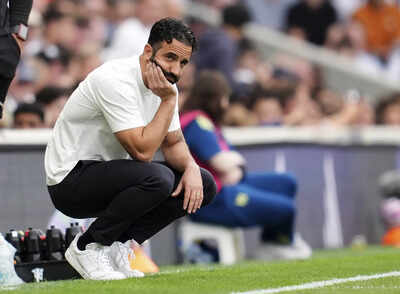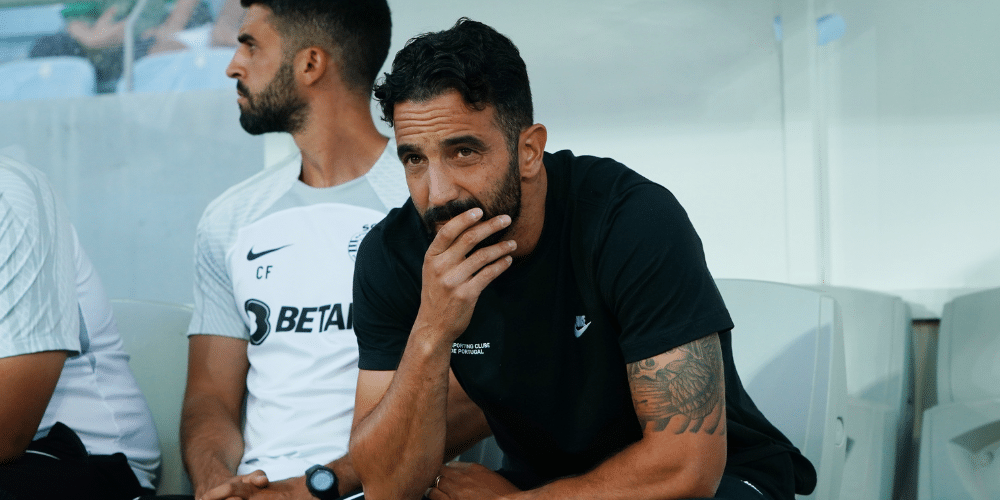In the ever-evolving landscape of football management, few names provoke as much debate and analysis as Ruben Amorim. Known for his distinctive coaching philosophy and tactical approach, Amorim’s tenure at Manchester United has been a rollercoaster ride for fans, critics, and rival managers alike. This article delves deeply into Ruben Amorim’s influence on Manchester United, exploring how he’s perceived through the eyes of his rivals, especially during the EPL 25-26 season, and unpacks the tactical intricacies, weaknesses, and potential future directions of the club under his leadership.
More Ruben Amorim – Redefining Manchester United’s Future with Innovative Tactics 2025
Introduction to Ruben Amorim

Background and Coaching Philosophy
Ruben Amorim has carved a niche for himself in modern football with a philosophy rooted in tactical flexibility, high pressing, and an emphasis on fluid attacking play. His background as a player in Portugal’s top leagues transitioned seamlessly into management, where he has gained recognition for turning around underperforming teams with innovative strategies. Critics often highlight his ability to organize teams defensively while maintaining a proactive, attacking mindset. His teams tend to press intensely, disrupt opponents’ build-up, and seek quick transitions to catch rivals off guard—a style that has both gained admiration and exposes vulnerabilities when not executed properly.
Unlike traditional managers who rely heavily on rigid systems, Amorim’s approach champions adaptability. This means shifting formations mid-game, exploiting opponent weaknesses, and emphasizing player intelligence and positional discipline. His coaching philosophy focuses on creating a cohesive team structure that prioritizes high-intensity pressing and quick ball recovery—integral to understanding his impact at Manchester United during the EPL 25-26 season.
Arrival at Manchester United
Amid increasing expectations and a desire for a fresh tactical identity, Manchester United’s board turned to Ruben Amorim with hopes that his innovative approach could revitalize the club’s fortunes. His arrival was met with optimism due to his impressive track record at Sporting Lisbon, where he transformed a club renowned for its inconsistent performances into league contenders with a distinct playing style. Yet, his transition to the Premier League proved challenging as the English top flight’s physicality and tactical complexity demanded adjustments.
From the outset, Amorim aimed to implement his football philosophy—prioritizing pressing, possession, and positional flexibility. However, the Premier League’s competitive environment exposed gaps between his tactical ideals and the squad’s current capabilities, sparking ongoing debate about his suitability and the long-term vision for Manchester United.
Overview of Manchester United’s Performance

Current Standings in the EPL
Entering the EPL 25-26 season, Manchester United’s standings have been a reflection of both their potential and persistent Achilles’ heels. Although they have demonstrated moments of brilliance under Amorim, inconsistencies have hampered their rise in the table. The club hovers around mid-table with glimpses of top-four aspiration, yet rival managers and analysts keep questioning whether their tactical blueprint aligns with the squad’s strengths.
Analyzing their performance, it’s evident that United’s results oscillate depending on the opposition faced. Against weaker teams, the team’s vulnerabilities become more exposed, often resulting in unexpected slips, whereas their performances against top-tier teams sometimes showcase better tactical discipline and resilience. This paradox raises critical questions about Amorim’s methods and the squad’s adaptability within his strategic framework.
Win-Loss Record Under Amorim
Ruben Amorim’s managerial record at Manchester United has been a mixed bag. Despite some promising high points, the overall win rate has not met the lofty expectations associated with his reputation. Wins against top clubs highlight his tactical potential, but losses and draws against supposedly weaker sides point to systemic issues. This inconsistency underlines the importance of analyzing not just surface results but the underlying tactical phenomena influencing outcomes.
The win-loss record underscores a key concern: Amorim’s team cannot maintain consistency, particularly when faced with the routine pressure of league matches. This discrepancy is often linked to tactical inflexibility, player adaptation challenges, and a failure to exploit the strengths of specific key players within his system.
Analyzing Amorim’s Tactical Approach

High-Pressure Style Explained
One of the defining features of Ruben Amorim’s tactical philosophy is his commitment to high pressing. His teams often aim to suffocate opponents in their own half, forcing turnovers high up the pitch and creating scoring opportunities through rapid counter-attacks. At Manchester United, this approach has become a signature move—but it reveals both strengths and weaknesses in execution.
High pressing relies heavily on coordinated team movement, stamina, and defensive organization. When executed correctly, it can times deliver effective results, forcing opponents into mistakes and gaining territorial dominance. Yet, it also demands a shared understanding among players, precise timing, and positional discipline, which have sometimes been lacking at United—leading to moments of vulnerability and conceding easy goals.
Key Strengths of Amorim’s Tactics
Despite the challenges, Ruben Amorim’s tactical approach boasts admirable strengths. His emphasis on intense pressing often disrupts opponents’ rhythm and provides quick transitions into attack, especially when the team’s offensive players are well-positioned. The fluidity in shifting formations—such as moving between 4-3-3, 3-4-3, or flexible hybrid systems—allows for tactical surprises.
Furthermore, Amorim’s focus on developing versatile, intelligent players who can adapt to different roles has been instrumental. His emphasis on collective defending and quick build-up play has the potential to unlock even tightly packed defenses if executed properly, offering Manchester United a distinct style that can be sharpened for greater consistency.
Rivals’ Perspectives on Amorim’s Style

Insights from Competing Coaches
Through the eyes of his rivals, Ruben Amorim is seen as a young, innovative manager who challenges conventional coaching paradigms. Rival managers acknowledge his tactical ingenuity—particularly his ability to adapt his team’s shape to exploit weaknesses—but also view his approach as somewhat predictable once opponents understand his core principles.
One prominent opposing coach noted that Amorim’s team tends to “stick to a game plan that, while effective at times, becomes readable after a few matches.” This predictability makes it easier for rival managers to devise specific counter-strategies, such as targeting midfield gaps or exploiting high wing positions. Another coach highlighted that the fundamental issue lies in Amorim’s inability to vary his tactical approach when facing well-organized defenses, which spells trouble against top-tier sides.
Strategic Counterplays Against Amorim’s Methods
Opposing coaches have crafted specific counterstrategies to neutralize Ruben Amorim’s tactics. Some have focused on maintaining possession to keep his high-pressing team from gaining turnovers, while others have utilized wide overloads to stretch the defensive compactness he advocates. Teams have also exploited the central midfield vulnerabilities that often arise when players push forward aggressively, creating space for quick counter-attacks—something rival managers emphasize during match preparations against United.
Importantly, rival managers believe the key to success against Amorim’s tactics is to exploit tactical inflexibility. By forcing Manchester United into predictable movement and quick transitions, they aim to nullify the team’s strength in pressing and counterattack, thus disrupting their rhythm and creating openings for goals.
Breakdown of Tactical Weaknesses

Midfield Vulnerabilities
A significant tactical weakness in Amorim’s setup is often observed in the midfield zone. The high-pressing strategy leaves gaps that disciplined opposition teams can punish through quick ball circulation and exploiting space between the lines. Several matches during the EPL 25-26 season exhibited how opponents could bypass the press by switching play or penetrating through central areas before Manchester United’s defensive structure could reset.
This vulnerability also stems from players’ positional discipline—sometimes the midfielders overcommit, leaving the backline exposed and creating opportunities for opposition forwards to isolate defenders or advance into dangerous positions. When combined with quick transitions, these gaps can be costly.
Wing Play Deficiencies
Wingers under Amorim’s system are tasked with both offensive penetration and defensive duties. However, the wing positions often become weak links, especially when the team adopts a high or wide attacking approach. This leads to vulnerable flanks that opponents can exploit with overlapping runs, crosses into the box, or quick counter-attacks from wide areas.
In the EPL 25-26, games have repeatedly shown how opponents target the wings to stretch United’s defensive lines, especially when wing-backs or wide midfielders are caught out of position trying to support the attack. The lack of consistent tracking back has resulted in conceding avoidable goals and losing width in defensive phases.
Predictability of Tactics
A core issue identified by analysts and rival managers alike is the predictability of Amorim’s tactical approach. He frequently relies on specific patterns—such as high pressing from the front, quick transitions, and fluid formations—that savvy opponents can analyze and counter effectively. This predictability becomes apparent over extended periods, diminishing the element of surprise and allowing opponents to prepare precise countermeasures.
This tactical rigidity hampers Manchester United’s ability to adapt during the game, especially when initial plans aren’t yielding desired results. As Amorim’s teams face more seasoned opposition, the inability to deviate from familiar patterns becomes a critical vulnerability.
The Paradox of Performance

Better Performances Against Stronger Opponents
One of the most intriguing aspects of Ruben Amorim’s tenure at Manchester United is the paradoxical trend where the team performs better against stronger opponents. Match analyses during the EPL 25-26 season have illustrated instances where United showcased tactical discipline, resilience, and even secured unexpected victories against teams considered superior.
This phenomenon might be attributed to the disciplined, reactive nature of Amorim’s tactics, which can be more effective against teams that play possession-based or high-risk attacking football. The pressure to perform against top-tier teams often galvanizes the squad to execute tactics more stringently, capitalizing on the opposition’s over-commitment and tactical naivety.
Struggles Against Weaker Teams
Conversely, Manchester United under Amorim struggles against weaker teams—an issue rooted in tactical inflexibility and over-reliance on certain game plans. These matches often showcase lapses in organization, lapses in defensive concentration, and difficulty in breaking down low-block systems that frustrate their attacking patterns.
The disparity suggests that Amorim’s team requires more adaptable game plans and the ability to vary their approach depending on opponent styles. The current disjoint between system and personnel leaves vulnerabilities that opponents exploit, thereby hindering consistent points acquisition.
Adaptability Issues in Amorim’s Tactics
Player Positioning Challenges
One of the recurring themes across analyses of Ruben Amorim’s tactics is the challenge associated with player positioning. His strategies demand high football intelligence, quick transitions, and positional versatility. However, not all Manchester United players currently possess these qualities, leading to mismatches on the pitch.
Frequent positional lapses and indecisiveness have resulted in defensive gaps and missed offensive opportunities. For example, when players fail to track wide runners or support centrally, the team becomes vulnerable to counter-attacks or conceding set-pieces.
Lack of Tactical Flexibility
Despite his reputation for tactical flexibility, Amorim has shown a tendency to fall back on familiar patterns when under pressure. This rigidity is problematic, especially when facing well-organized opponents that adapt quickly. The inability to switch formations or modify pressing intensity mid-game has cost Manchester United points and exposed structural weaknesses.
The absence of tactical variability limits United’s capacity to recover from unfavorable situations—an issue further complicated by over-reliance on specific players whose strengths do not perfectly align with the required tactical roles.
Impact on Fluidity of Play
Fluidity—the hallmark of a well-coached team—is often compromised under Amorim’s systems, particularly when personnel do not fully adapt or when opponents implement effective counters. Teams that lack the necessary cohesion or tactical discipline during transitions experience fragmentation, leading to loss of possession and conceding goals.
This disrupts the high-tempo style Amorim advocates, challenging the perception that his philosophy can be seamlessly implemented at Manchester United without significant personnel adjustments and tactical fine-tuning.
Understanding Rivals’ Strategies
How Opponents Prepare for Matches
Rival managers recognize the core principles of Amorim’s approach—high press, quick transitions, and positional fluidity—and develop bespoke strategies to neutralize these elements. Preparations involve rigorous analysis of Manchester United’s tendencies, pinpointing moments of predictability, and devising set-part plays designed to exploit weaknesses.
Teams emphasize maintaining possession to deny Amorim’s press and use quick, direct balls to expose the gaps left in the midfield or wide areas. They also prioritize disciplined defensive shapes that can absorb high-intensity pressing and swiftly execute counter-attacks.
Case Studies: Notable Matches Against Rivals
Examining specific matches against rivals during the EPL 25-26 season provides insights into how Amorim’s tactics play out against different styles. For instance, in a notable fixture against a top team, United’s structured pressing disrupted the opponent’s build-up, culminating in a rare victory. Conversely, encounters with mid-lower table sides highlight tactical lapses, defensive fragility, and the team’s struggles to impose their game plan.
These case studies emphasize the importance of tactical discipline, adaptability, and opponent analysis—areas where Amorim continues to seek growth.
Key Match Analyses
Tactical Breakdown of Selected Matches
In a critical encounter during the EPL 25-26, Manchester United faced a well-drilled opposition whose disciplined defensive organization tested Amorim’s tactical plans. The match highlighted vulnerabilities, such as midfield gaps and wide defensive lapses, which opponents exploited through quick counter-attacks and crossing.
The match underscored the importance of tactical flexibility. When Manchester United adapted by adjusting pressing intensity and shifting to a more conservative shape, they managed to regain control, illustrating that Ruben Amorim’s tactics can be effective but need to be applied dynamically.
Lessons Learned from Key Games
From these key matches, several lessons emerge: the need for greater tactical adaptability, improved positional discipline, and better utilization of squad strengths. It becomes evident that Amorim’s style shines brightest when the team maintains high organization and responds flexibly to game developments. However, rigid adherence to core principles hampers long-term success against diverse opponents.
Player Perspectives and Feedback
Voices from the Squad
Players’ insights into Ruben Amorim’s coaching reveal a mixture of admiration and frustration. Some praise his innovative tactics and emphasis on tactical intelligence, while others express difficulties in adapting to his high-pressing demands and positional shifts. Several squad members indicate that consistent understanding of roles is essential for the team’s success and that clarity in expectations could enhance performance.
Impact of Coaching Style on Player Performance
The coaching style directly influences individual player performances—especially in roles requiring quick decision-making and positional awareness. When players grasp the tactical framework, they tend to perform better, but lapses in understanding lead to mistakes that opponents capitalize on. This dynamic underscores the significance of tailored coaching, clear communication, and patience in implementing Amorim’s innovative approach.
The Importance of System and Personnel Alignment
Current Player Strengths and Weaknesses
The efficacy of Ruben Amorim’s tactics depends heavily on deploying the right personnel. Currently, Manchester United’s squad has notable strengths in versatility and athleticism but also faces limitations such as lack of tactical discipline or technical finesse in certain positions. For example, the defensive line requires consistency and positional awareness, while midfielders need to excel in reading the game and supporting pressing.
Recommendations for Re-evaluation
A strategic review should focus on aligning personnel with tactical demands. Introducing players who are tactically intelligent, adaptable, and capable of executing rapid positional shifts can enhance Amorim’s system. Simultaneously, redefining roles for certain players and investing in development programs could bridge skill gaps and improve fluidity.
Future Implications for Manchester United
Potential Changes in Tactical Approach
Looking ahead, Manchester United under Amorim could benefit from diversifying their tactical repertoire—incorporating varied pressing schemes, flexible formations, and situational adaptations. Emphasizing tactical discipline without sacrificing the team’s attacking identity will be crucial. Enhanced opposition analysis and varied training drills can prepare the squad to handle the strategic diversity required in broader competition.
Long-term Vision for Amorim at the Club
The long-term success of Ruben Amorim at Manchester United hinges on patience, ongoing tactical refinement, and personnel development. His ability to adapt his philosophy to the Premier League’s demands while fostering player growth will determine whether he can establish a sustainable winning culture. A strategic focus on blending tactical innovation with squad compatibility promises potential if managed thoughtfully.
Notes
Key Takeaways from Rival Analyses
Ruben Amorim’s approach, while innovative, faces hurdles stemming from predictability and tactical inflexibility. Opponents recognize his strengths in high press and quick transitions but exploit weaknesses in midfield coverage and wide areas. Success against stronger teams indicates strategic competence, but struggles against weaker sides expose systemic issues.
Lessons for Aspiring Managers
Emerging managers should learn that tactical flexibility and continuous analysis are essential for long-term success. Amorim’s case emphasizes the importance of aligning system with personnel capabilities and remaining adaptable to opponent strategies. Clear communication and iterative learning underpin effective team development.
Mistakes to Avoid
Neglecting Tactical Flexibility
Over-reliance on a singular system can leave teams vulnerable to different styles of play. Managers should prioritize developing a flexible tactical framework that can adapt in real-time to the flow of the game, especially in diverse competitions like the Premier League.
Underestimating Opposing Strategies
Opponent analysis should be a continuous process; overlooking how rival teams prepare and adapt reduces the chances of neutralizing effective tactics. A proactive scouting and adaptation plan is vital.
Misalignment Between System and Player Skills
Implementing a system without considering the squad’s strengths often leads to tactical failures. Long-term success relies on understanding each player’s attributes and tailoring strategies accordingly.
Frequently Asked Questions
What makes Ruben Amorim a notable coach?
Ruben Amorim is notable for his tactical innovation, emphasis on pressing, and ability to transform teams with limited resources. His approach promotes fluid formations, collective defending, and rapid counter-attacks, making him a significant figure in modern coaching.
How does Amorim’s style compare to his predecessors?
Compared to predecessors, Amorim is more focused on flexible, adaptive football rather than rigid systems. His emphasis on high pressing and positional fluidity contrasts with more traditional, defensive-minded managers, offering a fresh approach that emphasizes attacking fluidity and tactical versatility.
What changes could enhance Manchester United’s performance under Amorim?
To improve, Manchester United should enhance tactical flexibility, optimize personnel for pressing and transitions, and develop players’ understanding of adaptive systems. Incorporating varied tactical setups and detailed opponent analysis can elevate the team’s consistency and performance.
Conclusion
In summary, Ruben Amorim’s tenure at Manchester United illustrates a coach with a bold tactical vision whose strengths revolve around high pressure, fluid formations, and adaptability—albeit with notable vulnerabilities in midfield organization, wing play, and tactical predictability. Through the eyes of his rivals, it’s evident that opponents have identified exploitable weaknesses that, if addressed, could elevate United’s performance. The ongoing challenge lies in aligning the system tightly with the squad’s skills, embedding tactical flexibility, and learning from both successes and setbacks. As Manchester United continues this tactical odyssey, the future depends on strategic adjustments, player development, and the resilience to evolve beyond current limitations—an endeavor that Ruben Amorim seems poised to undertake with the right support and adaptation.

